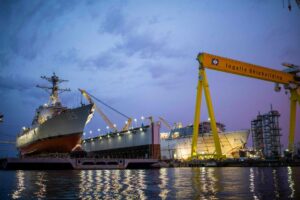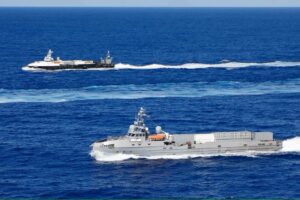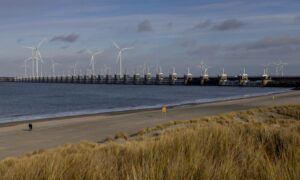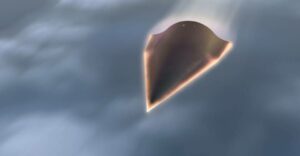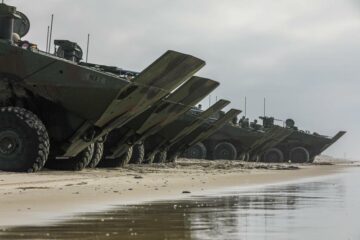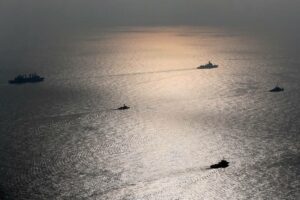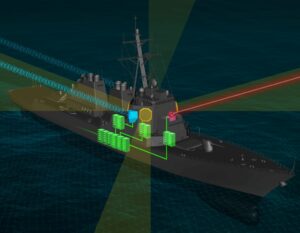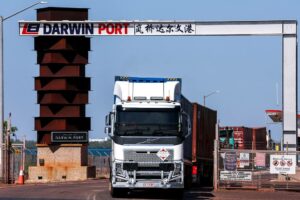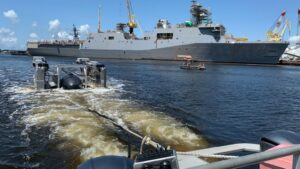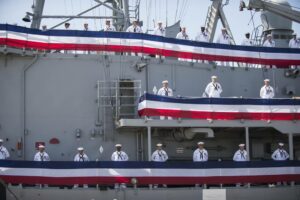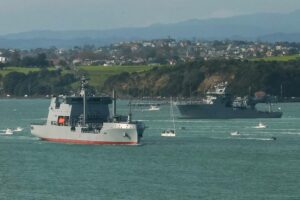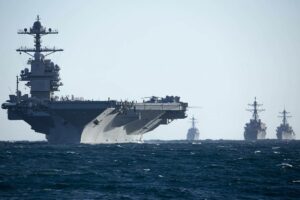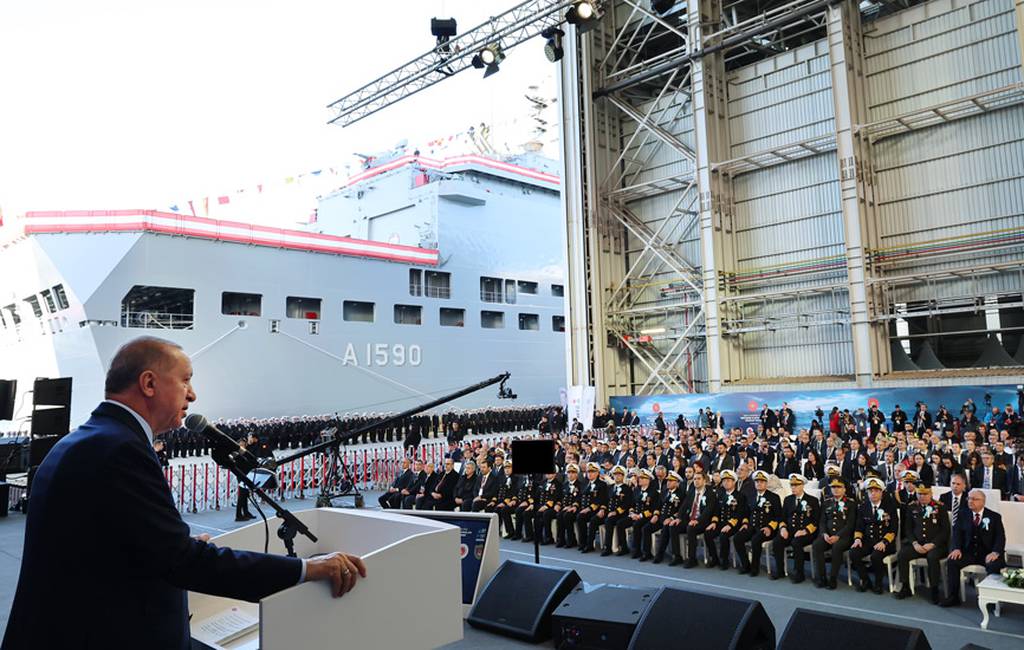
ISTANBUL — Two supply ships, a frigate and an unmanned surface vessel entered service with the Turkish navy on Friday.
A commissioning ceremony took place at Sefine Shipyard in Yalova, where the company constructed the largest of the vessels, the replenishment and logistics ship TCG Derya. Those attending the event included the country’s president, defense minister, chief of the General Staff and the top naval officer.
Defense News has gathered information about these vessels from Turkish government social media posts, open-source intelligence firm Jane’s, company websites, a now-retired Turkish naval official and internal analysis.
TCG Derya is the second-largest ship in the Turkish navy after the amphibious assault ship TCG Anadolu. The new vessel can carry 10,000 tons of fuel, 750 tons of fresh water and 270 cubic meters of cargo. The ship is 199.9 meters long and 24.4 meters wide. Its displacement is 26,115 tons.
With its single General Electric-made LM2500 gas turbine and two diesel engines, the ship can reach 24 knots (28 mph). The ship has two Gökdeniz gun mounts and two 25mm remote control weapons stations. It also features a landing pad, two hangars and two replenishment-at-sea rigs on each side.
The ship’s primary mission is to supply a task force based around the TCG Anadolu.
The other supply ship, the TCG Üsteğmen Arif Ekmekçi, is the second and last vessel of the country’s logistics support ship program. It is 106.51 meters long and 16.8 meters wide. Its displacement is 8,477 tons. Its two diesel engines can propel the ship to a maximum speed of 12.5 knots.
Like its sister ship, the TCG Üsteğmen Arif Ekmekçi has spare room to accommodate a task force. It can carry eight standard ISO containers, 631 tons of potable water, 336 tons of JP-5 fuel and 4,036 tons of F-76 fuel. There is also a medical facility for performing surgeries.
This ship has a large landing pad, but no hangar nor replenishment-at-sea equipment. However, it can provide astern refueling to other ships.
Its construction began in 2017, but was paused as the Selah Shipyard that won the original tender to build two ships went bankrupt. The local firm STM took over the project as the main contractor.
The frigate TCG Istanbul is the inaugural vessel of its class; three more are under construction, and the government recently authorized four additional units.
The frigate has a full-load displacement of 3,100 tons, a length of 113.2 meters, a beam of 14.4 meters, and a draft of 4.05 meters. It can achieve a top speed of 29 knots and has a standard range of 6,000 nautical miles (6,905 miles) at 12 knots. The ship can accommodate a crew of 125.
The frigate is equipped with 16 Atmaca anti-ship missiles. It is also armed with Hisar-D and Sapan missiles to counter airborne threats by using the domestically made vertical launching system MIDLAS. Its inclusion on the ship follows the cancellation of a planned purchase of the MK41 Vertical Launching System due to U.S. sanctions.
The unmanned surface vessel commissioned Friday is named TCB 1101. The “TCB” designation is also given to planes, helicopters and large unmanned vessels.
The USV is 15 meters long and has a range of 400 nautical miles. It is armed with one 12.7mm remote control weapons station and features electronic warfare technology.
The vessel took part in the NATO exercises REPMUS 22 and Dynamic Messenger 22, both of which occurred in Portugal.
Cem Devrim Yaylali is a Turkey correspondent for Defense News. He is a keen photographer of military ships and has a passion for writing about naval and defense issues. He was born in Paris, France, and resides in Istanbul, Turkey. He is married with one son.
- SEO Powered Content & PR Distribution. Get Amplified Today.
- PlatoData.Network Vertical Generative Ai. Empower Yourself. Access Here.
- PlatoAiStream. Web3 Intelligence. Knowledge Amplified. Access Here.
- PlatoESG. Carbon, CleanTech, Energy, Environment, Solar, Waste Management. Access Here.
- PlatoHealth. Biotech and Clinical Trials Intelligence. Access Here.
- Source: https://www.defensenews.com/naval/2024/01/19/turkish-navy-receives-unmanned-surface-vessel-three-crewed-ships/
- :has
- :is
- :where
- 000
- 10
- 100
- 11
- 12
- 125
- 14
- 15%
- 16
- 2017
- 22
- 24
- 26
- 28
- 29
- 400
- 51
- 70
- 750
- 8
- 9
- a
- About
- accommodate
- Achieve
- Additional
- After
- also
- an
- analysis
- and
- ARE
- armed
- around
- AS
- assault
- At
- attending
- authorized
- bankrupt
- based
- Beam
- began
- born
- both
- build
- but
- by
- CAN
- Cargo
- carry
- ceremony
- chief
- class
- company
- construction
- Containers
- Contractor
- control
- country’s
- crew
- Defense
- designation
- diesel
- displacement
- domestically
- draft
- due
- dynamic
- each
- eight
- Electronic
- Engines
- entered
- equipment
- equipped
- Event
- Facility
- Features
- Firm
- follows
- For
- Force
- four
- France
- fresh
- Friday
- from
- Fuel
- GAS
- gathered
- General
- given
- Government
- he
- helicopters
- However
- HTTPS
- images
- in
- Inaugural
- included
- inclusion
- information
- Intelligence
- internal
- ISO
- issues
- Istanbul
- IT
- ITS
- jpg
- Keen
- landing
- large
- largest
- Last
- launching
- Length
- local
- logistics
- Long
- made
- Main
- maximum
- Media
- medical
- Messenger
- Military
- minister
- missiles
- Mission
- more
- Named
- New
- news
- no
- nor
- occurred
- of
- Officer
- official
- on
- ONE
- open source
- original
- Other
- over
- pad
- paris
- part
- passion
- paused
- performing
- photographer
- Place
- Planes
- planned
- plato
- Plato Data Intelligence
- PlatoData
- Portugal
- Posts
- president
- primary
- Program
- project
- Propel
- provide
- purchase
- range
- reach
- receives
- recently
- Refueling
- remote
- resides
- Room
- s
- Sanctions
- Second
- second-largest
- service
- ship
- ships
- side
- single
- sister
- Social
- social media
- Social Media Posts
- son
- speed
- Staff
- standard
- station
- Stations
- supply
- support
- Surface
- system
- Task
- task force
- tcg
- Technology
- Tender
- that
- The
- There.
- These
- those
- three
- to
- tons
- took
- top
- turbine
- Turkey
- Turkish
- two
- u.s.
- under
- units
- using
- vertical
- Vessel
- vessels
- was
- Water
- Weapons
- websites
- went
- which
- wide
- with
- Won
- writing
- zephyrnet

